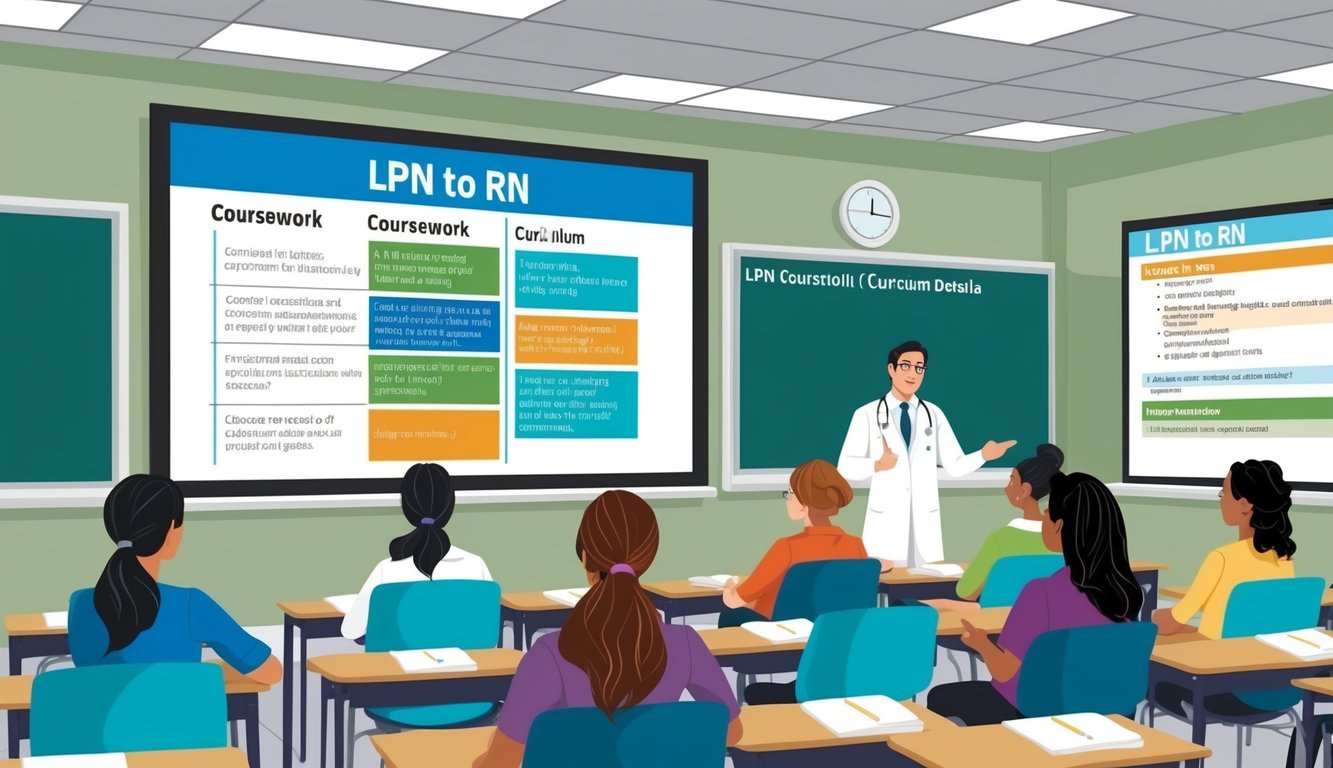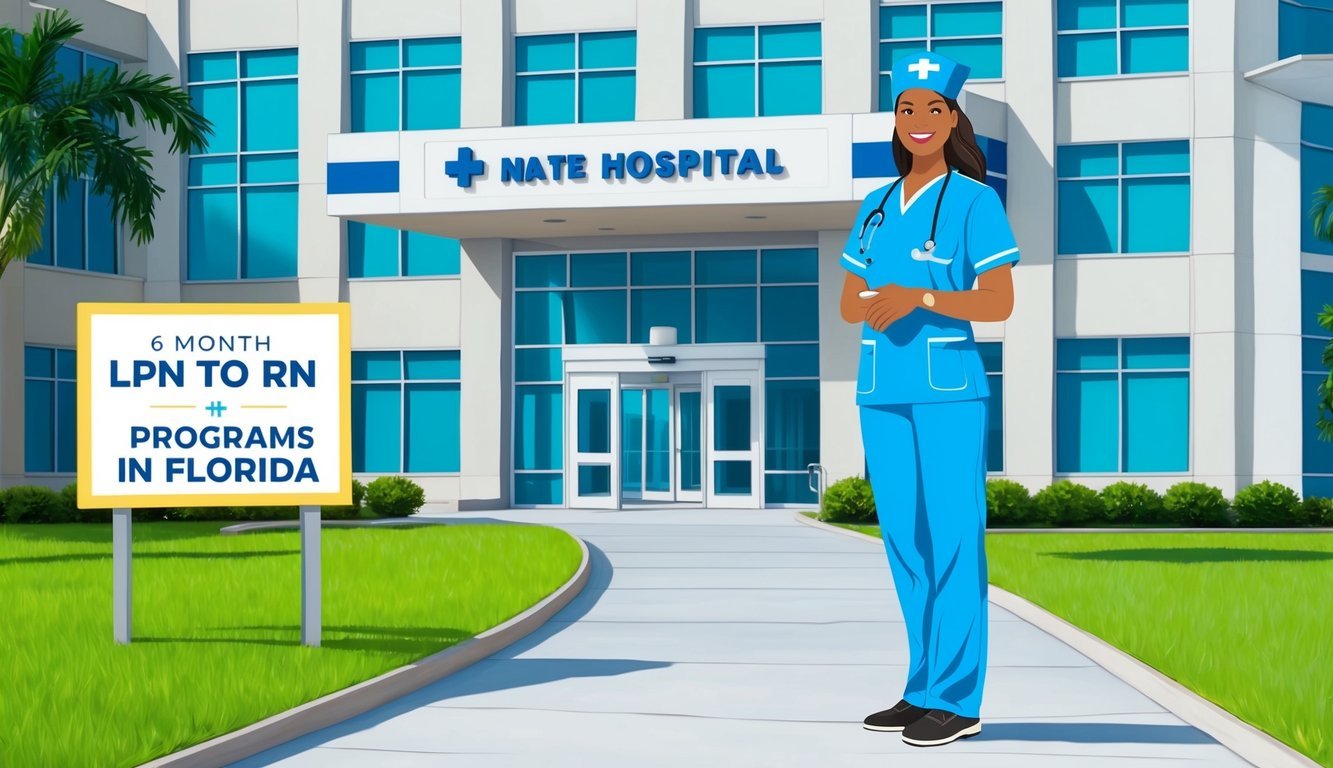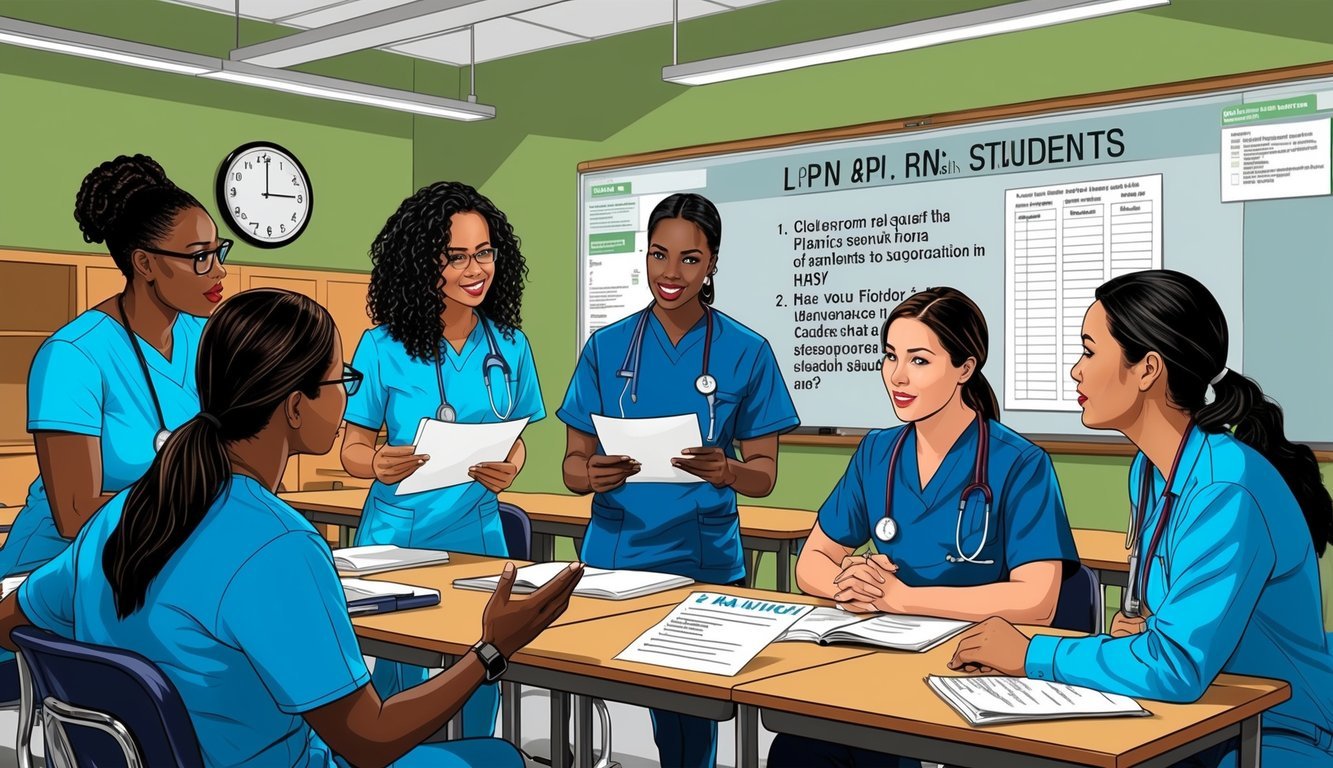If you’re a Licensed Practical Nurse (LPN) looking to advance your career, consider enrolling in a 6-month LPN to RN program in Florida.
These programs offer a fast track to becoming a Registered Nurse, allowing you to enhance your skills and expand your job opportunities in the nursing field.
With many institutions offering both online and campus-based courses, you can choose a format that fits your lifestyle.

The transition from LPN to RN is not only about increasing your qualifications; it’s also a way to achieve upward mobility in your nursing career.
You’ll gain extensive clinical training and hands-on experience, preparing you for the demands of high-quality patient care.
With the right program, you can be ready to sit for the RN licensure examination in just six months.
Exploring these programs can provide the answers you need about admission requirements, coursework, and potential career outcomes.
You’ll find that investing in your education can lead to numerous benefits in your professional life.
Key Takeaways
- Learn how transitioning from LPN to RN can enhance your nursing career.
- Discover the specific coursework and clinical training involved in 6-month programs.
- Understand the potential outcomes and opportunities available to RNs in Florida.
Understanding LPN to RN Programs in Florida
LPN to RN programs help licensed practical nurses advance their education and career.
In Florida, you can choose from options such as Associate Degree in Nursing (ADN) and Bachelor of Science in Nursing (BSN) programs.
Each pathway has unique requirements, benefits, and duration.
LPN-RN Transition
Transitioning from LPN to RN involves completing an accredited program that qualifies you for the RN licensure exam.
In Florida, many schools offer such programs, including Florida Gateway College and Rasmussen University.
The LPN-RN programs generally take about 12 to 18 months to complete.
These programs often include both classroom instruction and clinical practice.
Upon completion, you will receive an Associate Degree in Nursing (ASN), allowing you to sit for the NCLEX-RN exam.
Many LPN-RN programs also provide support services like tutoring and career counseling to help you succeed.
LPN to BSN Programs
Pursuing an LPN to Bachelor of Science in Nursing (BSN) is another option for registered nurses.
A BSN can lead to advanced roles in nursing administration, education, and specialty areas.
In Florida, several institutions offer LPN to BSN programs, including Herzing University.
These programs typically take longer than ADN options, ranging from 18 months to 3 years.
The curriculum covers topics such as leadership, research, and community health.
Earning a BSN may also open doors for higher salary opportunities and career advancement.
LPN to ADN Programs
LPN to Associate Degree in Nursing (ADN) programs are a popular choice for those looking to become RNs.
These programs focus on core nursing skills and essential clinical practice.
Typically, LPN to ADN programs last about 12 months and involve comprehensive coursework.
You will learn subjects like pharmacology, anatomy, and medical-surgical nursing.
Schools such as Catawba Valley Community College offer flexible options to accommodate working nurses.
Tuition costs vary, so always check with the school for specific fees and payment plans.
This pathway prepares you to take the NCLEX-RN exam, leading to employment as a registered nurse in various healthcare settings.
Admission Requirements and Prerequisites

When considering a transition from LPN to RN in Florida, it’s essential to understand the specific admission requirements and prerequisites.
These criteria ensure that you are prepared for the nursing curriculum and can successfully complete the program.
Entrance Examinations
Most LPN-to-RN programs require you to complete an entrance examination.
Common tests include the TEAS (Test of Essential Academic Skills) and other assessments like the ACT or SAT.
| Exam Type | Purpose | Required Score |
|---|---|---|
| TEAS | Measures readiness for nursing education | Typically 70% or higher |
| ACT | Assesses college readiness | Varies by program |
| SAT | Another college readiness test | Varies by program |
You may need to show proof of scores within a specified timeframe.
Verify with your chosen school for the exact requirements.
Academic Criteria
Your academic background plays a significant role in your admission.
Generally, you need to have a valid LPN licensure and complete prerequisite courses.
Typical prerequisites include:
- Anatomy and Physiology
- Microbiology
- Psychology
Most programs also demand a minimum GPA, often around 2.75 or higher.
Additionally, some schools require documented work experience as an LPN.
It’s crucial to check the specific academic criteria for the programs you are interested in, as they may vary across institutions.
Coursework and Curriculum Details

In 6-month LPN-to-RN programs, coursework focuses on essential nursing knowledge and skills needed for advanced patient care.
The curriculum balances core nursing courses, clinical experiences, and specialized training to prepare you for a successful nursing career.
Core Nursing Courses
Core nursing courses form the backbone of your education.
You will study essential topics, including:
- Pharmacology: Understanding medications, their effects, and safe administration.
- Health Assessment: Learning to perform comprehensive physical assessments and recognize signs of illness.
- Critical Thinking: Developing skills to make sound clinical judgments in high-pressure situations.
These courses aim to build a solid foundation in nursing practices.
You will also explore healthcare ethics and evidence-based practice, ensuring you can provide compassionate and informed care in various healthcare settings.
Clinical Experience
Clinical experience is a vital part of your training.
You will complete hands-on practice in diverse healthcare settings, allowing you to apply knowledge from coursework.
- Clinical Skills: You’ll practice skills like wound care, IV administration, and patient monitoring.
- Patient Care: The experience focuses on delivering high-quality, patient-centered care.
This exposure helps you gain confidence and competence.
It prepares you to work effectively with healthcare teams and deal with real-life patient scenarios.
Specialized Training
Specialized training equips you with advanced skills tailored to specific nursing roles.
This may include:
- Critical Care: Learning to handle patients with acute conditions that require immediate attention.
- Nursing Skills: Developing proficiency in advanced techniques such as telemetry or emergency care.
These specialized courses provide deeper knowledge and skills that are crucial for specific nursing areas.
You will be better prepared to meet diverse patient needs and excel in high-demand environments.
For more resources on nursing education, you can visit Nursing Process.
Clinical Training and Hands-On Experience

Clinical training is a vital part of your journey in the LPN-to-RN programs.
It equips you with the skills needed for real-world nursing care.
Your education will focus on both clinical rotations and lab work, which provide a comprehensive hands-on training experience in various healthcare settings.
Clinical Rotations
During clinical rotations, you will gain valuable experience in different healthcare environments.
These rotations occur in hospitals, clinics, and community health settings.
You will work directly with patients under the supervision of experienced nurses.
Your rotations will cover various fields including:
- Public Health: Learn about community health issues and prevention strategies.
- Home Healthcare: Gain skills in providing nursing care in patients’ homes.
- Hospital Wards: Experience high-paced environments focusing on critical care.
Each rotation allows you to apply your knowledge from the classroom while developing your clinical practice skills.
Programs often have partnerships with local healthcare facilities, enhancing the quality of your training.
Lab Work and Simulations
In addition to clinical rotations, lab work and simulations are crucial for your hands-on experience.
Nursing programs use simulation labs to replicate real-life scenarios.
This allows you to practice essential nursing care procedures in a controlled environment.
Key components of lab work include:
- Skill Demonstrations: Practice essential skills like administering injections or wound care.
- Simulated Patient Interactions: Engage in scenarios that mimic real patient situations to build critical thinking and decision-making skills.
- Feedback Sessions: Receive constructive feedback from instructors to improve your techniques.
These experiences prepare you for the realities of nursing, ensuring you feel confident in your abilities when you begin clinical practice.
Outcomes and Career Opportunities

Transitioning from an LPN to an RN opens up numerous pathways for growth in your nursing career.
You will prepare for the NCLEX-RN exam, leading to expanded roles in healthcare.
Additionally, you’ll discover a variety of employment opportunities with better salaries compared to LPN positions.
Licensure Exam Preparation
After completing a six-month LPN to RN program, you will apply to take the NCLEX-RN exam.
This exam is mandatory to obtain your RN license.
Preparation for the NCLEX-RN involves:
- Coursework: Intensive nursing classes cover advanced topics not included in LPN training.
- Practice Tests: Engaging with NCLEX practice questions helps build your confidence.
- Study Groups: Collaborating with peers can enhance your understanding and retention of material.
You may also consider online resources and review courses specifically designed for NCLEX-RN prep to maximize your chances of success.
Employment Prospects
Once you earn your RN license, various job opportunities will be available.
RNs can work in:
- Hospitals: Providing acute care in various departments.
- Nursing Homes: Offering specialized care for elderly patients.
- Outpatient Clinics: Managing patients’ ongoing healthcare needs.
Your average salary as an RN is significantly higher than that of an LPN.
Factors impacting salary include:
- Experience: More years typically lead to higher pay.
- Location: Urban areas often offer better compensation.
- Specialization: Specialized fields can increase earnings.
By completing your LPN to RN transition, you will be better equipped to advance your nursing career and take on greater responsibilities in patient care.
Frequently Asked Questions

In this section, you will find important details regarding the enrollment requirements, top institutions, the possibility of online programs, program duration, costs, and NCLEX exam eligibility for LPN to RN programs in Florida.
What are the requirements for enrolling in an LPN to RN program in Florida?
To enroll in an LPN to RN program in Florida, you typically need to hold a valid LPN license.
You may also be required to provide official transcripts from your LPN program and take a standardized entrance exam.
Which institutions offer the best LPN to RN bridge programs in Florida?
Many schools in Florida offer quality LPN to RN bridge programs.
Some of the top institutions include community colleges and state universities.
You can find detailed comparisons through online resources that list the best programs available.
Is it possible to complete an LPN to RN program online in Florida, and how does it work?
Yes, many programs offer online options.
These programs combine online coursework with required clinical experience in your local area.
You’ll need to ensure that your chosen program is accredited for proper recognition.
What is the typical duration of an LPN to RN bridge program in Florida?
LPN to RN bridge programs in Florida typically take around 6 to 12 months to complete.
The exact duration will depend on the specific program and whether you attend full-time or part-time.
How much does it cost to transition from an LPN to an RN in Florida?
The cost of transitioning from LPN to RN can vary widely.
On average, you can expect to pay between $10,000 to $20,000 for tuition.
You’ll also need to budget for additional costs such as books, supplies, and examination fees.
Can an LPN legally challenge the RN NCLEX in Florida without completing a bridge program?
In Florida, LPNs usually need to complete an approved bridge program before taking the RN NCLEX exam.
Skipping this step is not typically allowed.
For specific regulations, check with the Florida Board of Nursing.

